Dec 20, 2018
Rural life in Japan: Meeting people pointing the way to real fulfillment
Gallery - Rural life in Japan: Sougeisya, Morimachi, Shizuoka
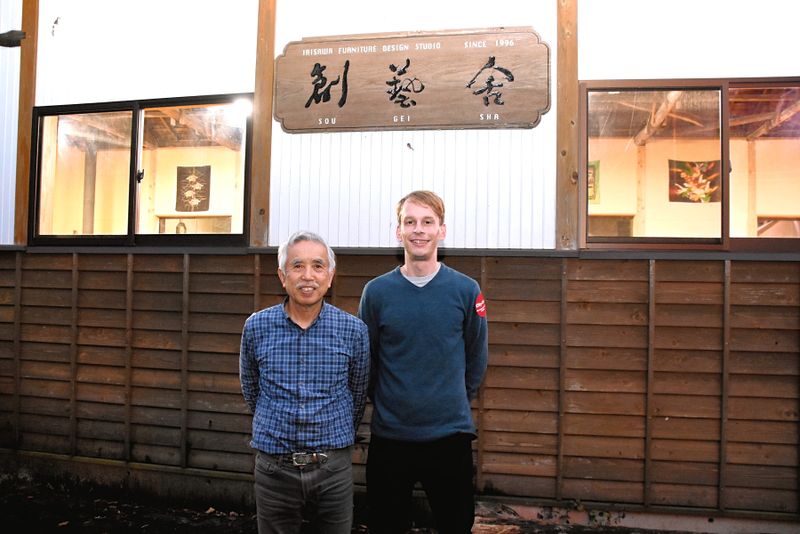
If what the revitalization of rural Japan needs is for those who’ve fled to the city to see that, in actual fact, the rural life can offer something more fulfilling, then all eyes should be on the town of Enshu Morimachi, in Shizuoka Prefecture, where Takao Irisawa is showing us around his corner of rural Japan.
Irisawa (73) and his wife reside in, and run Sougeisya (創藝舎), their charming home-cum-agricultural lodging (noka minshuku) from which the pair offer visitors a chance to sample the charms of rural living.
“If people want foreigners to come and live in areas like this, they have to actually show them the kind of rich lifestyle that is possible, but few people seem to have woken up to this yet,” explains Irisawa.
And what a lifestyle. We’re sitting in the living room and communal area of Sougeisya (創藝舎) - a beautiful, airy space with an open staircase leading up to guest rooms in the loft - as we chow down on some homemade hoshigaki (made from dried persimmon, cut into thin strips to serve with our coffee) and attempt to put the world to rights.
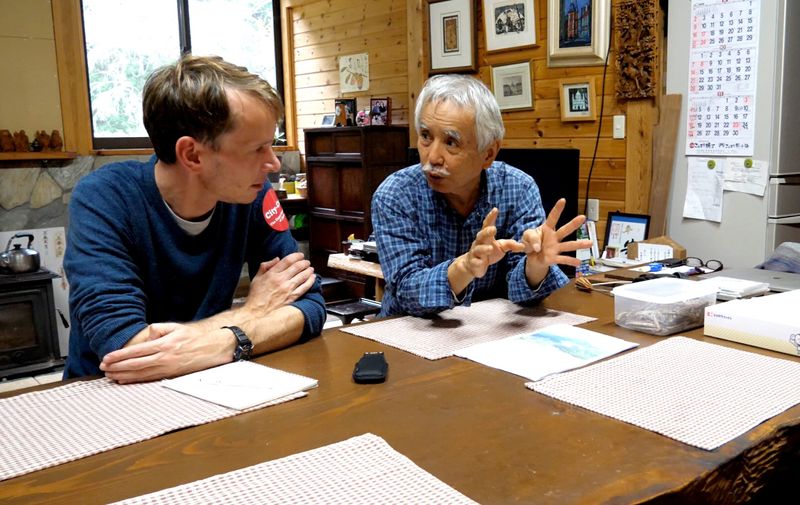
(Putting the world to rights with Takao Irisawa at his Sougeisya home, Morimachi, Shizuoka)
Hoshigaki, mushrooms, garlic, rice … the fruits of Irisawa’s rural lifestyle are dotted about Sougeisya (Irisawa greeted us brandishing a bucket of sword beans) where visitors can take in agricultural experiences based on the seasons.
While terms like “noka minshuku” and “farm stay” have, in recent years, become staple jargon in tourism circles in Japan as industry and local government seek ways to draw at least some attention away from the seduction of the big city, for Irisawa the “rural” experience has the potential to go deeper.
“Having people experience things like agricultural minshuku and exchanging ideas with each other in the process, these experiences can bring about changes within the self,” he says with the confidence of someone who’s been around the block over the years, or in Irisawa’s case, around the world.
After stints in LA, France, and Venezuela among others, Irisawa retired from a globe-trotting life in construction at the age of 50, turning his hands from the building of factories to that of wood furnishings and the reformation of an old saw mill (now Sougeisya) in the mountains north of central Morimachi.
In what started out as place to hang out and drink with friends, Irisawa and his wife have developed Sougeisya into a gallery and exhibition space, a venue for live performances (an eclectic mix of tango, chorus, classical and “anything”), and the aforementioned noka minshuku.
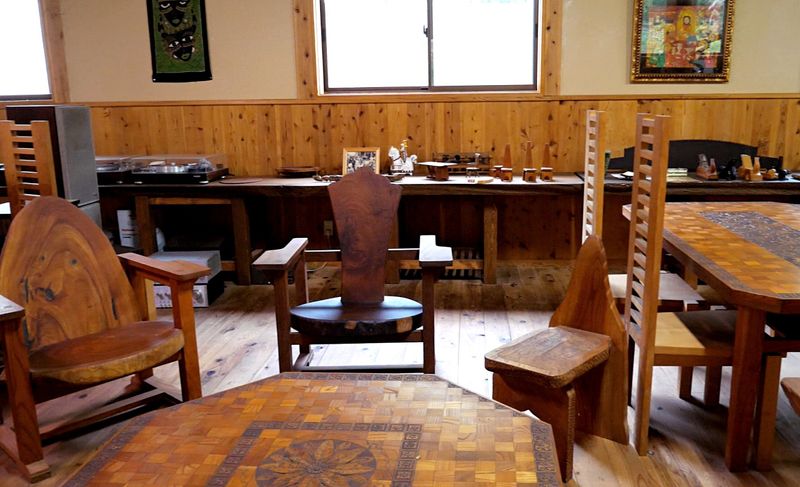
(Gallery and live space, Sougeisya, Morimachi, Shizuoka)
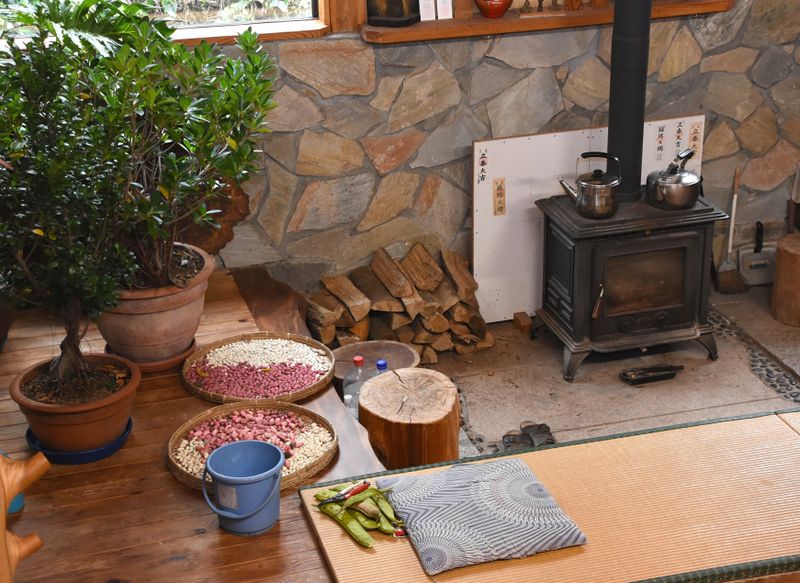
(Living space, Sougeisya, Morimachi, Shizuoka)
The couple now live here full time, tending to the land and a platoon of around 50 chickens, while continuing to tinker with their property (a terrace overlooking the river and a cafe are currently in the works).
“For Japanese people, there’s still a sense that if you mention the word “farming,” they’ll think of having to get dirty, or of a hard life, so they’re reluctant to come,” says Irisawa, highlighting one of the challenges facing attempts to attract people to the rural life in Japan.
But where many people in urban Japan harbor a somewhat bleak image of the situation facing those that remain in the rural areas, Irisawa would appear to believe the opposite is true.
“It’s difficult to put into words, you have to feel it. One day isn’t enough but if you stay, say, for one week, making your own food, conditioning the body, going to neighbors fields and picking the fruits, digging up the potatoes, buying and drinking their tea, if people do things like this, they’ll realise how fun the lifestyle can be.”
As well as a potential need then to dispel any myths about the hardships of rural life in Japan, there is perhaps the need to do so in conjunction with a reevaluation of what the fulfilling life might be, especially for those of us caught up in the proverbial rat race of urban living.
With such lifestyles dictated by doable distances of commute and a current climate in which permanent workers feel that they can’t pack it all in Irisawa concludes that, “people are forgetting what it is that is actually fulfilling.”
The yearning among people for something different is there though. Earlier in 2018, Irisawa and his wife opened the doors of Sougeisya as part of an “open house” event held in Morimachi, aiming to showcase rural life success stories.
“Everyone revealed a longing for a similar kind of lifestyle,” Irisawa tells us of the people who visited Sougeisya during the event.
“But there were people who had given up on similar projects, people who felt that the timing would make it impossible for them,” he continues, drawing knowing laughs from members of our team upon hearing remarks that have oft been the conclusion to conversations we’ve had during the evenings in Morimachi about packing it all in in favor of the rural life.
Irisawa offers us an olive branch of hope though.
“If you have the desire to do it, well, you can do it.”
But you might need the contacts.
We asked Irisawa, despite the appeals of administrators and authorities to bring people out of the city and into the country, does rural Japan have a reluctance in accepting outsiders, as is sometimes the case in our own countries?
“Yes, basically you have the same situation here,” comes the blunt truth. “But I want to be a barrier against such people,” he tells us, explaining the importance of personal introductions over just turning up unannounced, something which he says is “delicate” and should be handled on a case-to-case basis.
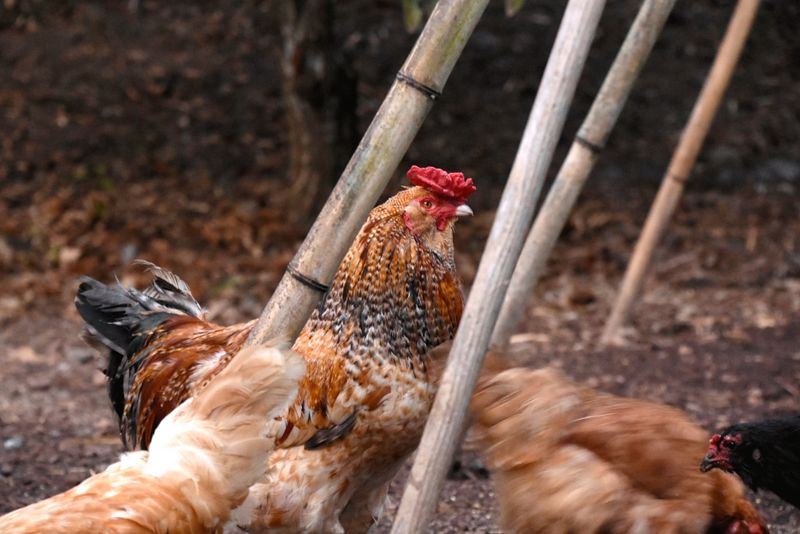
(Irisawa's "chicken tractors," Morimachi, Shizuoka)
Comparisons of lifestyle choices and attitudes between Japan and our countries of birth leads us to digress from the topic at hand, and we could listen to Irisawa talk for hours, about the rural life and beyond, as he brings his overseas experience to bare. The light is drawing in though and we’ve yet to go out and see the chickens, or the “chicken tractor” as he refers to them.
I’m writing these words now from an office in the middle of Tokyo’s booming chaos but it’s comforting to know that if I had the desire to make a lifestyle change, people like Irisawa could inspire and ease the transition. And if what the rural life in Japan needs is examples to show of how fulfilling it can be, with Irisawa and his Sougeisya, it's got one that shines.
for more about rural life in shizuoka & Japan
Video highlights ...
Sougeisya (創藝舎)
Web: https://morisougeisha.com/72343/



0 Comments